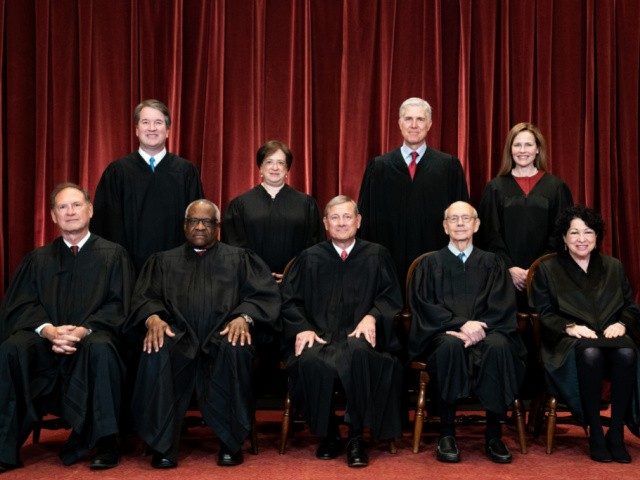The United States Supreme Court (SCOTUS) on Monday ruled against a criminal illegal alien, previously convicted of felony DUI and deported, seeking to avoid deportation after illegally re-entering the U.S.
Refugio Palomar-Santiago, an illegal alien from Mexico, obtained a green card in 1990, a year before the state of California convicted him of felony DUI. In 1998, Palomar-Santiago waived his right to appeal after being ordered deported by a federal immigration judge. Subsequently, he was deported to Mexico the next day.
In 2017, Palomar-Santiago was charged and indicted for illegally re-entering the U.S. Palomar-Santiago challenged the indictment, hoping to avoid deportation, by citing Leocal v. Ashcroft in which the Supreme Court ruled in 2004 that a DUI does not necessarily make a foreign national eligible for deportation.
The U.S. Court of Appeals for the Ninth Circuit affirmed a district court’s decision allowing Palomar-Santiago to dismiss the illegal re-entry indictment.
Associate Justice Sonia Sotomayor wrote in a 9-0 decision that the “Ninth Circuit’s interpretation is incompatible” with federal statute, ruling against Palomar-Santiago:
That section provides that defendants charged with unlawful reentry “may not” challenge their underlying removal orders “unless” they “demonstrat[e]” that three conditions are met: (1) they have “exhausted any administrative remedies,” (2) they were “deprived . . . of the opportunity for judicial review,” and (3) “the entry of the order was fundamentally unfair.” 8 U. S. C. §1326(d). The requirements are connected by the conjunctive “and,” meaning defendants must meet all three. When Congress uses “mandatory language” in an administrative exhaustion provision, “a court may not excuse a failure to exhaust.” Ross v. Blake, 578 U. S. 632, 639 (2016). Yet that is what the Ninth Circuit’s rule does. [Emphasis added]
Without the benefit of the Ninth Circuit’s extrastatutory exception, §1326(d)’s first two procedural requirements are not satisfied just because a noncitizen was removed for an offense that did not in fact render him removable. Indeed, the substantive validity of the removal order is quite distinct from whether the noncitizen exhausted his administrative remedies (by appealing the immigration judge’s decision to the BIA) or was deprived of the opportunity for judicial review (by filing a petition for review of a BIA decision with a Federal Court of Appeals). [Emphasis added]
“The judgment of the Court of Appeals for the Ninth Circuit is reversed, and the case is remanded for further proceedings consistent with this opinion,” Sotomayor wrote.
The ruling certifies that foreign nationals must meet all federal requirements necessary to challenge deportation orders even when their previous deportation is later found to be based on an offense that is no longer necessarily grounds for deportation.
Immigration Reform Law Institute (IRLI) President Dale Wilcox said in a statement:
… today’s ruling shows that the full Supreme Court, without dissent, is capable of applying the law as written, even when immigration is concerned, and of reversing a lower court that had rewritten that law based on its own policy preferences. We applaud today’s decision for its sound logic, and for upholding the will of the American people as expressed through their representatives in Congress.
The case is U.S. v. Palomar-Santiago, No. 20–437 in the Supreme Court of the United States.
John Binder is a reporter for Breitbart News. Email him at jbinder@breitbart.com. Follow him on Twitter here.

COMMENTS
Please let us know if you're having issues with commenting.